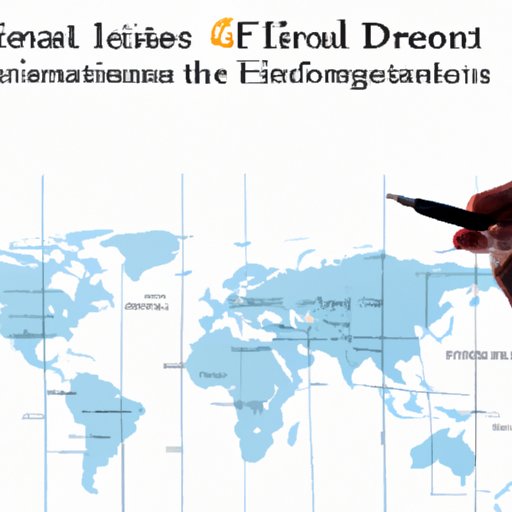Introduction
Foreign direct investment (FDI) is an important economic tool that involves a company investing its resources in another country. It is a form of international capital flow, where companies invest their resources in foreign markets to further their business interests and gain access to new markets and resources. FDI can take many forms, from joint ventures and mergers and acquisitions, to greenfield investments and cross-border alliances. In this article, we will explore what FDI is, the benefits and drawbacks of FDI, the impact of FDI on global economies, the different types of FDI, and the role of government in facilitating FDI.
Exploring the Basics of Foreign Direct Investment
FDI is an important source of capital for developing countries and is an integral part of international trade and investment. FDI is defined as a long-term investment by a company in another country with the purpose of establishing a lasting interest in that country. It can take the form of establishing new operations or acquiring existing businesses. Companies invest their resources in foreign markets to increase their profits, diversify their portfolios, and gain access to new markets and resources.
What are the Benefits and Drawbacks of FDI?
FDI has both benefits and drawbacks for host countries. On the one hand, FDI can bring foreign capital, technology, and jobs to a host country, which can help to spur economic growth and development. FDI can also create opportunities for local businesses to collaborate with multinationals, allowing them to benefit from increased access to technology and expertise. FDI can also lead to increased competition in a host country, which can result in greater efficiency and lower prices for consumers.
On the other hand, FDI can have some drawbacks. For example, there is the risk that multinationals can take advantage of weak labor laws in host countries, resulting in low wages and poor working conditions. Furthermore, FDI can lead to a “brain drain” of talented professionals from host countries, as multinationals often employ highly skilled workers from abroad. Finally, FDI can lead to an increase in inequality in host countries, as multinationals often pay higher wages than domestic companies, resulting in a widening gap between the rich and the poor.

Examining the Impact of FDI on Global Economies
The impact of FDI on global economies is complex and far-reaching. On the one hand, FDI can lead to increased economic growth and development, as it brings in foreign capital and creates jobs. FDI can also lead to increased competition, resulting in greater efficiency and lower prices for consumers. Furthermore, FDI can stimulate technological advancement, as multinationals often bring with them advanced technology and know-how.
On the other hand, FDI can have some negative impacts. For example, multinationals may take advantage of weak labor laws in host countries, resulting in low wages and poor working conditions. Furthermore, FDI can lead to a “brain drain” of talented professionals from host countries, as multinationals often employ highly skilled workers from abroad. Finally, FDI can lead to an increase in inequality in host countries, as multinationals often pay higher wages than domestic companies, resulting in a widening gap between the rich and the poor.

Understanding the Different Types of FDI
FDI can take many forms, from greenfield investments and mergers and acquisitions, to joint ventures and cross-border alliances. Greenfield investments involve a company setting up a wholly owned subsidiary in a foreign country. This type of FDI involves the company building its own facilities, such as factories or offices, in the host country. Mergers and acquisitions involve a company purchasing an existing business in a foreign country. Joint ventures involve two or more companies coming together to form a new company in a foreign country. Cross-border alliances involve two or more companies collaborating to pursue common objectives in a foreign country.

Analyzing the Role of Government in Facilitating FDI
In order to attract foreign direct investment, governments must create an attractive environment for investors. Governments can do this by creating policies and regulations that make it easier for foreign companies to invest in their countries. Governments can also offer tax incentives and other financial incentives to encourage foreign investment. Furthermore, governments can create special economic zones that offer favorable terms for foreign companies to set up operations. These measures can help to attract FDI and boost a country’s economy.
Conclusion
FDI is an important economic tool that can bring much needed capital and jobs to developing countries. However, FDI can also have some drawbacks, such as the risk of exploitation of workers and the creation of inequality. It is therefore important for governments to create an environment that is conducive to FDI while also protecting the rights of workers. Furthermore, it is important to understand the different types of FDI and the role of government in facilitating FDI in order to maximize the benefits of FDI for all stakeholders.
(Note: Is this article not meeting your expectations? Do you have knowledge or insights to share? Unlock new opportunities and expand your reach by joining our authors team. Click Registration to join us and share your expertise with our readers.)
